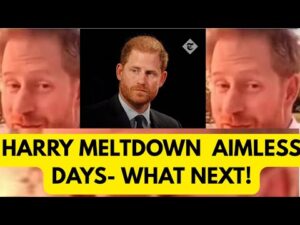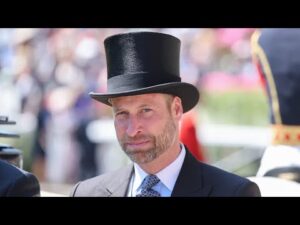Prince William Cuts All Ties After DNA RESULT Reveal His True Paternity

Starting from the beginning: “Imagine discovering that the man you’ve called father your entire life never was.” This sentence needs a period at the end. The next line: “Tonight, the royal family faces its greatest scandal yet.” That’s correctly punctuated. Then, “Prince William has severed all ties with King Charles after a secret DNA test shattered everything he believed about his past.” That’s a complete sentence, so a period is needed.
Moving on, I see some dialogue without quotation marks. For example: “I am sorry we lied.” This should be in quotes. Also, some sentences run together without proper commas, like “What really happened behind palace walls? Why was the truth buried for decades?” These are separate questions, so each should end with a question mark.
I also notice some missing commas after introductory phrases: “When William finally confronted his father, or rather the man he had always called father,” should have a comma after “father.”
There are instances where sentences are fragments but need to be combined or adjusted. For example: “The document did not mince words. Probability of paternity, 0%.” The second sentence is a fragment, but in the context of a document, it’s acceptable as a standalone line.
I need to check for consistency in hyphenation and possessive forms. For example, “King Charles III’s biological father” should have an apostrophe-s.
Also, some paragraphs are too long and should be broken up for readability. For example, after the DNA test results, the narrative could be split into shorter paragraphs to separate William’s thoughts and actions.
I should ensure that all dialogue is properly enclosed in quotation marks and that each new speaker’s line starts on a new paragraph. For example, when Charles says, “I am sorry,” it should be in quotes and properly separated from the narration.
Additionally, there are some typos like “corders” which should be “courtiers,” “cordier” might be “courtier,” and “vacasillated” should be “vacillated.” These need correction for accuracy.
Lastly, the text uses some non-standard punctuation like “unmed” which might be “unmanned,” so I should check those for possible typos.
After addressing all these issues, the text should be properly punctuated, with correct grammar, dialogue formatting, and paragraph breaks to enhance readability and coherence.
Here is the punctuated and revised version of the text, with corrections for grammar, punctuation, and clarity. Key adjustments include adding quotation marks for dialogue, proper sentence termination, paragraph breaks for readability, and corrections of typos:
Imagine discovering that the man you’ve called father your entire life never was. Tonight, the royal family faces its greatest scandal yet. Prince William has severed all ties with King Charles after a secret DNA test shattered everything he believed about his past. In a moment that stunned the world, King Charles broke his silence, whispering the words no one ever thought they’d hear: “I am sorry we lied.”
What really happened behind palace walls? Why was the truth buried for decades? And what does this explosive revelation mean for the future of the British monarchy? Stay with us. What you’re about to hear will change everything. Before we continue, please hit the like button, subscribe to the channel, and turn on the notification bell for updates.
The grandeur of Buckingham Palace had always been a symbol of unbreakable tradition, a monument to the strength of a lineage that traced back over a thousand years. Tourists from around the globe stood at its gates, hoping for a glimpse of history, of royalty, of a family that had come to represent the very essence of Britain itself. And at the heart of it all was Prince William, the beloved future king, the bridge between a glorious past and a promising future.
But beneath the gilded ceilings and the ancient portraits, a secret had been festering for decades—one so devastating, so earth-shattering that once exposed, it would shake the very foundations of the monarchy. It began not with the fanfare of an official announcement, but with a whisper, a rumor passed quietly among royal insiders, hidden in hushed conversations behind closed doors. For years, it had been dismissed as just another vicious fabrication of the tabloids. After all, the royal family had always been a magnet for scandal, for invented stories that sold newspapers and filled airwaves.
But this time, the whisper had teeth. And this time, it had the cold, undeniable precision of science behind it. Prince William, the very figurehead of the monarchy’s future, had discovered that his lineage was not what he had been led to believe. In a moment that seemed plucked straight from a Shakespearean tragedy, a single sheet of paper—clinical, sterile, unforgiving—revealed the truth: King Charles III was not his biological father.
The blood that had been celebrated as royal, the heritage that had been his birthright, had been a carefully protected illusion. The man who had cradled him as a child, guided him as a young prince, prepared him to one day wear the crown had hidden a devastating secret. For Prince William, the revelation was more than just a personal betrayal. It was an existential rupture. His very identity, the narrative of his life, carefully woven by generations of tradition and expectation, was suddenly in tatters.
The implications were not limited to personal heartbreak. They struck at the very heart of the monarchy’s legitimacy. How could a nation rally behind a king whose bloodline was now in question? How could a man who had been deceived his entire life continue to represent the epitome of honor, duty, and service?
The DNA test had been conducted in absolute secrecy. No one outside a trusted handful of confidants even knew it had taken place. William himself had ordered it after years of private doubts that he had long buried under loyalty and a desire for peace. But something—perhaps an old letter from his mother, perhaps a casual comment from a courtier who didn’t know he was listening—had ignited a spark of suspicion. And once the idea had taken root, it had been impossible to ignore.
When the results arrived, they came in an unmarked envelope delivered not to the palace, but to a discreet, private location William had arranged. No courtiers, no advisers, no handlers—just him, alone, staring at the brutal finality of a scientific verdict that would change everything.
The document did not mince words:
Probability of paternity: 0%.
For several minutes, William could do nothing but sit, staring at the lines of text as if willing them to rearrange themselves into something less catastrophic. His mind raced back through every memory, every moment where he had sought Charles’s approval, every time he had looked to him for guidance, for love, for pride. Had Charles known all along? Had every embrace, every word of encouragement, been laced with guilt, with the silent weight of deception?
When William finally confronted his father—or rather, the man he had always called father—the conversation was not held in the grand halls of Buckingham or the formal offices of Clarence House. It was in a quiet, private sitting room, far from the eyes of the world, where two men stripped of their titles and armor could speak not as monarch and heir, but as wounded human beings.
King Charles did not deny it. He did not bluster, nor did he attempt to justify the lie. Instead, he wept. For the first time in William’s memory, he saw the king—the man he had spent a lifetime trying to please—utterly undone. Between racking sobs, Charles confessed that the deception had not been entirely his idea. He had been pressured, manipulated, even coerced by forces larger than himself: advisers, family members, the ancient machinery of monarchy that placed the survival of the crown above all else, even above truth.
“I am sorry,” Charles whispered, his voice barely audible. “I am sorry we lied.”
There are moments in life when time seems to fracture. When everything that comes after is permanently divided from everything that came before. For William, this was such a moment. The trust, the love, the sense of belonging that had bound him to his father, to his family, to his very identity as a royal, shattered like glass beneath the hammer of that simple, devastating truth.
In the days that followed, William withdrew from public life. Official statements cited a need for family time, for private reflection. The palace spun the narrative as best they could, but within the inner circles of the aristocracy, the truth was already seeping out like water through cracks in a dam. And when it finally broke into the public consciousness through a leaked document, a whispered confirmation from a source too credible to ignore, it ignited a firestorm unlike anything the royal family had ever faced.
There were those who rallied behind William, seeing in his betrayal a mirror of their own disillusionments with institutions that had long demanded loyalty while offering lies. There were those who saw him as a tragic figure, a modern-day Hamlet caught between duty and truth. And there were those, cold-eyed and pragmatic, who whispered that perhaps this was the final nail in the coffin of a monarchy already staggering under the weight of scandal






